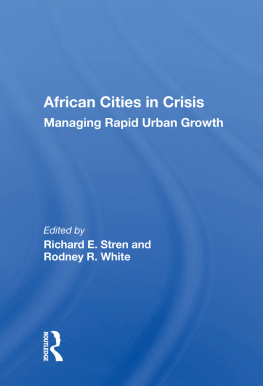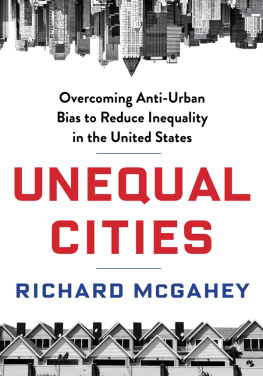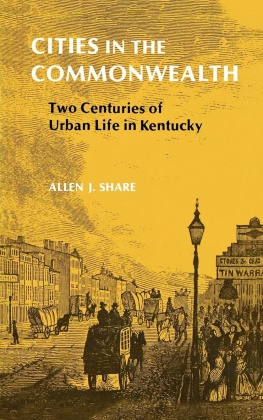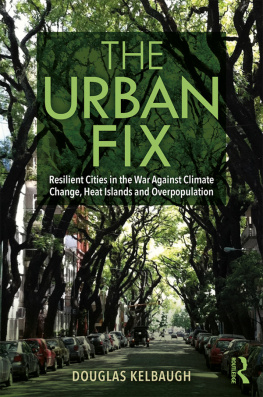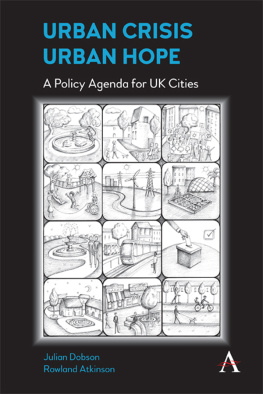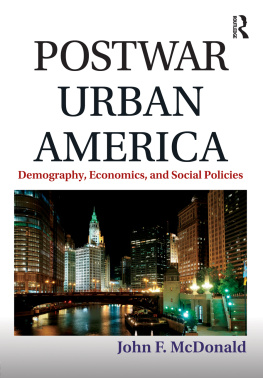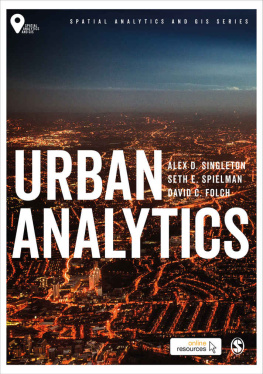African Cities in Crisis
African Modernization and Development Series
Paul Lovejoy, Series Editor
Psychoses of Power: African Personal Dictatorships, Samuel Decalo
African Cities in Crisis: Managing Rapid Urban Growth,
edited by Richard E. Stren and Rodney R. White
Patriarchy and Class: African Women in the Home and the Workforce,
edited by Sharon B. Stichter and Jane L. Parpart
The Precarious Balance: State and Society in Africa,
edited by Donald Rothchild and Naomi Chazan
African Population and Capitalism: Historical Perspectives,
edited by Dennis D. Cordell and Joel W. Gregory
Southern African Labor Migration and the South African Gold Mines: 1960-1984, Jonathan Crush, Alan Jeeves, and David Yudelman
African Cities in Crisis
Managing Rapid Urban Growth
Edited By
Richard E. Stren
Rodney R. White
African Modernization and Development Series
First published 1989 by Westview Press, Inc.
Published 2018 by Routledge
52 Vanderbilt Avenue, New York, NY 10017
2 Park Square, Milton Park, Abingdon, Oxon OX14 4RN
Routledge is an imprint of the Taylor & Francis Group, an informa business
Copyright 1989 Taylor & Francis
All rights reserved. No part of this book may be reprinted or reproduced or utilised in any form or by any electronic, mechanical, or other means, now known or hereafter invented, including photocopying and recording, or in any information storage or retrieval system, without permission in writing from the publishers.
Notice:
Product or corporate names may be trademarks or registered trademarks, and are used only for identification and explanation without intent to infringe.
Library of Congress Cataloging-in-Publication Data
African cities in crisis.
(African modernization and development series)
Bibliography: p.
Includes index.
1. Urban policyAfrica. 2. Cities and towns
AfricaGrowth. 3. UrbanizatioAfrica. I. Stren,
Richard E. II. White, Rodney R. III. Series.
HT148.A2A34 1989 307.7'6'096 87-31622
ISBN 0-8133-7466-9
ISBN 13: 978-0-367-01836-8 (hbk)
Contents
Rodney R. White
Richard E. Stren
Richard E. Stren
Adepoju G. Onibokun
Koffi Attahi
Kankonde Mbuyi
Thiecouta Ngom
Saitiel Kulaba
Mohamed O. El Sammani, Mohamed El Hadi Abu Sin, M. Talha, B.M. El Hassan, and Ian Haywood
Diana Lee-Smith
The currencies referred to in this book are listed below with their average (official) exchange rate to the 1985 Annual Supplement of the Quarterly Economic Reviews of The Economist Intelligence Unit. However, it is not always easy to interpret these exchange rates as many of them greatly overvalue the currency compared with the unofficial rates which more closely reflect their purchasing power. The rates are quoted for the period when most of the fieldwork reported in these studies was carried out.
| Cte d'Ivoire | CFA franc | 437 per $ |
| Kenya | Kenyan shilling | 14.414 per $ |
| Nigeria | naire | 0.8 per $ |
| Senegal | CFA franc | 437 per $ |
| Sudan | Sudanese pound | 1.3 per $ (official) |
| 2.5 per $ (alternative) |
| Tanzania | Tanz. shilling | 18.10 per $ |
| Zaire | zaire | 36.1 per $ |
The funding of urban projects in Africa in the late 1970s was overshadowed by national and international attempts to establish agriculture as the highest priority for development. Although reality rarely matched rhetoric, this shift in discourse drew attention away from efforts that had begun in such a promising fashion in the early 1970s to reform certain sectors of urban management (Cohen 1983). These attempts at reform included the promotion of aided self-help housing (involving sites and services as well as squatter upgrading schemes), support for administrative decentralization, and a new tolerance for and understanding of the informal sector.
Throughout the 1970s the largest cities in each country grew very rapidly as a result of migration from the rural areas and the high rate of natural increase of the established urban-dwellers. Although comparative data on rural and urban health conditions are difficult to obtain, water supply and basic health care in the cities seem to have been adequate to prevent mortality rates from surpassing those in rural areas. (Whether the spread of AIDS will change this relationship remains to be seen.) The very rapid urban population growth rates that resulted from the conjunction of these demographic trends all but overwhelmed the reform efforts.
Yet under increasingly difficult conditions, urban governments continued to operate, turning to home-made solutions, or at least accepting the grim reality as an inevitability (Stren 1986). Without other alternatives, some governments began to tolerate the survival tactics of the urban poor squatting on illegally occupied land, using "pirate" taxis and minibuses in competition with the public transport services, and relying on community-based self-help groups to develop water, roads, and educational facilities when none of these appeared in the official Master Plan. The growing gap between the realities of official plans and perspectives, on the one hand, and the mushrooming world of the urban poor, on the other hand, has scarcely been studied in African cities. This book presents the results of the first project which was designed to study comparatively governmental responses to this gap in Africa.
This study (which came to be known as the "African Urban Management" project) was first proposed at a meeting held in Nairobi in April 1982, funded by the International Development Research Centre (IDRC), Ottawa, and by the International Federation of Institutes for Advanced Study (IFIAS), headquartered now at Toronto. Leaders of the seven research teams represented in this volume were present at that first meeting. The African countries in the group were Cte d'Ivoire, Kenya, Nigeria, Senegal, Sudan, Tanzania, and Zaire. These countries together represented Anglophone and Francophone traditions, east and west Africa, "socialism" and "state capitalism" in ideological persuasion, as well as humid and semi-arid climates.
At that first meeting in Nairobi, it was decided that a comparative framework would be essential if the lessons drawn from one country were to be applicable elsewhere. However, since the ultimate purpose of the research was to carry out "policy-relevant" studies and since every country has its own agenda of urban issues, it was decided that each country team would make the decision on the sector or sectors for intensive study. The comparative framework which each team accepted as the basis for its own research was empirical, not highly abstract or theoretical. The reasoning behind this approach was twofold. First, the results of the study had to be understandable to local administrators, politicians, and officials who might not be au courant with theories of urban development, however fascinating these might be to the academic researchers themselves. Second, there is very little published work of any kind on the urban problems as discussed in this book. And what has been published in formal publications or fugitive documents is quickly outdated by the pace of change. On the premise that good theory needs a firm groundwork of empirical investigation, the case studies in this volume stress the empirical rather than the theoretical.


